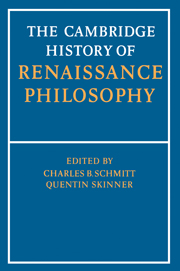Book contents
- Frontmatter
- Introduction
- PART 1 THE INTELLECTUAL CONTEXT
- PART 2 PHILOSOPHY AND ITS PARTS
- 6 Logic and language: Traditional logic
- 7 Logic and language: Humanistic logic
- 8 Natural philosophy: Traditional natural philosophy
- 9 Natural philosophy: The new Philosophy of nature
- 10 Natural philosophy: Astrology and magic
- 11 Moral philosophy
- 12 Political philosophy
- 13 Psychology: The concept of psychology
- 14 Psychology: The organic soul
- 15 Psychology: The intellective soul
- 16 Metaphysics
- 17 Problems of knowledge and action: Fate, fortune, providence and human freedom
- 18 Problems of knowledge and action: Theories of knowledge
- 19 Problems of knowledge and action: Epistemology of the sciences
- 20 Philosophy and humanistic disciplines: Rhetoric and poetics
- 21 Philosophy and humanistic disciplines: The theory of history
- PART 3 SUPPLEMENTARY MATERIAL
- Biobibliographies
- Bibliography
- Index nominun
- Index rerum
- References
20 - Philosophy and humanistic disciplines: Rhetoric and poetics
from PART 2 - PHILOSOPHY AND ITS PARTS
Published online by Cambridge University Press: 28 March 2008
- Frontmatter
- Introduction
- PART 1 THE INTELLECTUAL CONTEXT
- PART 2 PHILOSOPHY AND ITS PARTS
- 6 Logic and language: Traditional logic
- 7 Logic and language: Humanistic logic
- 8 Natural philosophy: Traditional natural philosophy
- 9 Natural philosophy: The new Philosophy of nature
- 10 Natural philosophy: Astrology and magic
- 11 Moral philosophy
- 12 Political philosophy
- 13 Psychology: The concept of psychology
- 14 Psychology: The organic soul
- 15 Psychology: The intellective soul
- 16 Metaphysics
- 17 Problems of knowledge and action: Fate, fortune, providence and human freedom
- 18 Problems of knowledge and action: Theories of knowledge
- 19 Problems of knowledge and action: Epistemology of the sciences
- 20 Philosophy and humanistic disciplines: Rhetoric and poetics
- 21 Philosophy and humanistic disciplines: The theory of history
- PART 3 SUPPLEMENTARY MATERIAL
- Biobibliographies
- Bibliography
- Index nominun
- Index rerum
- References
Summary
THE SCOPE OF RHETORIC AND POETICS
The modern reader approaching Renaissance texts in the expectation of finding a clear-cut distinction between rhetoric and poetics will soon be disappointed. Their isolation as critical terms is a product of post-Romantic literary theory, deriving from a period in which traditional rhetoric had been banished from education. To approach a rhetorical culture like the Renaissance with post- or even anti-rhetorical expectations is obviously anachronistic, and can only produce complaints about the ‘confusion’ of rhetoric with poetics. To us the two disciplines seem to be directed to different goals: poetics, deriving from poiesis, is the art of making a poem or work of literature, whereas rhetoric is concerned with constructing effective, that is, persuasive discourse. A pure poetics would consider the artwork on its own, while rhetoric would see it in terms of its effect on an audience. But in the Renaissance, as in other periods, poetry used techniques of proof and persuasion, addressed itself to the practical intellect and existed as a force for good or evil in the world. Renaissance readers did not regard literary works as autotelic; indeed, the concept that any work of art could be self-ended, without a function in human life, would have been foreign. In that period classical rhetoric, enthusiastically revived, provided a comprehensive system both for creating and for evaluating works of literature, by which they meant not just poetry, drama and fiction, but also letters, history and philosophical treatises. While rhetoric and poetics were notionally separate disciplines from philosophy, given a distinct and subordinate place in the university arts curriculum, in practice during the Renaissance both became attached to ethics.
- Type
- Chapter
- Information
- The Cambridge History of Renaissance Philosophy , pp. 713 - 745Publisher: Cambridge University PressPrint publication year: 1988
References
- 40
- Cited by



